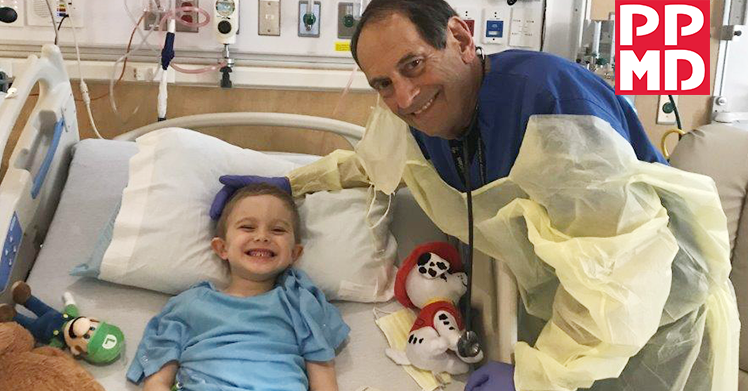
“DMD gene therapy went well. It was started at 1:15 PM and ended at 2:27 PM”
On Thursday, January 4, I received this message from Dr. Jerry Mendell accompanied by the photo above – Dr. Mendell at the bedside of a young boy at Nationwide Children’s Hospital and a smile I could ‘hear’ across the miles.
The gene therapy study had been scheduled for December, but the child developed a stomach flu that quickly resolved and we were all hoping for an early Christmas gift. But Dr. Mendell worried that the stomach ‘bug’ might travel through the family and decided it best to postpone until January 4.
January 4 was THE day. A number of PPMD team members and families were running the Walt Disney World 5K. As we lined up in our respective corrals, I found it difficult to balance excitement, anxiety, hope. Fireworks at 5:30am started the first corral. The day sparkled with anticipation. The 5K was complete by 8 and we waited patiently, counting the minutes. And then…the message above from Dr. Mendell.
On January 6, 2017 we announced a $2.2 million dollar grant to Dr. Mendell, Dr. Louise Rodino-Klapac (co-PI), and Nationwide Children’s Hospital. A year later, we have the first child dosed – an incredible feat in a disease where it feels like everything takes years and years of waiting!
Our purpose in awarding this grant was to open and accelerate the field of gene therapy – a strategy that seemed impossible as a potential treatment for Duchenne back in the 1990s. If successful, it will provide systemic delivery of a microdystrophin construct that targets both skeletal and cardiac muscle achieved through one IV injection. The FDA has approved the protocol and now we have the first child dosed.
The grant PPMD provided – a grant funded by people like you, and partner Duchenne foundations, who believe in innovation and the potential of gene therapy – was the first project of our Gene Therapy Initiative, which includes further exploration of CRISPR/Cas9, GALGT2, and Dup2 technologies, as potential therapeutic approaches to treating Duchenne.
We will learn a lot from this study at Nationwide: questions around the production of sufficient virus, understanding and preventing an immune response, and how to deliver systemically (throughout the entire body).
The child continues to do well. It is believed that it takes five days for the virus to deliver the payload, to fully integrate into heart and muscle cells. How long after will we see positive change? We are hopeful that by PPMD’s Annual Conference in Arizona in June, Dr. Mendell and others may talk about early signs.
With Dr. Mendell’s message last week, I breathed a sigh of relief and said a prayer asking for success, continued hope, and the dawn of a new day in Duchenne.
Gene therapy has been a marathon, years in the making (30 to be exact) and the fact that it started at the beginning of the PPMD Walt Disney World Marathon Weekend seems exactly right. Gene therapy is here.
Godspeed to Dr. Mendell. To Sarepta. To Solid. To Pfizer/Bamboo. And thank you to everyone who continues to support PPMD’s Gene Therapy Initiative, including our most successful holiday campaign ever!
The $2.2 million grant to Nationwide Children’s Hospital, Dr. Mendell, and Dr. Rodino-Klapac was made possible in part by the generous support of additional Duchenne foundations, including: Team Joseph, Team Saij, The Fund for Pete’s Sake, Rashad’s family, and The Nicholoff family. PPMD is grateful for their partnership.
To learn more about this trial or the other micro-dystrophin gene therapy trials currently in the early stages of recruitment, visit our recent blog.



 by: Parent Project Muscular Dystrophy
by: Parent Project Muscular Dystrophy

